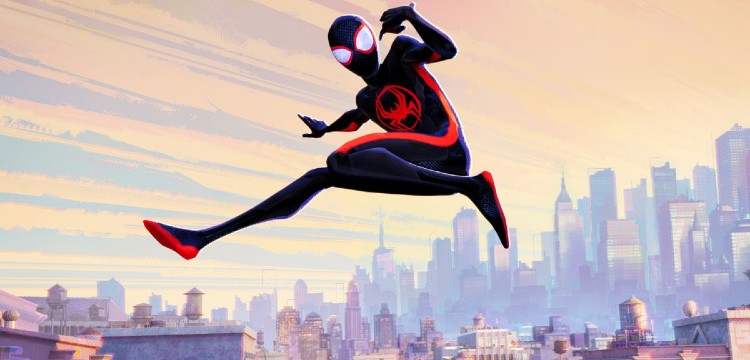
“Spider-Man: Across the Spider-Verse” – Great expectations.
Five years ago, Spider-Man: Into the Spider-Verse surprised us in theaters, then surprised us again by winning the Oscar for Best Animated Feature. Like all great films, it did something new, namely an animation style that looked like it leapt from the pages of a comic book. It also featured characters more fleshed out and nuanced than most films, connecting with us at levels many films don’t even know exist. When the sequel, Spider-Man: Across the Spider-Verse, was finally announced, we were rightly concerned that it wouldn’t live up to its predecessor. I’m happy to say I’m surprised again.
Across the Spider-Verse picks up more than a year after Miles Morales (Shameik Moore) and his spider-friends stopped Kingpin from destroying all the universes. In a very good opening twist, we’re greeted not by Miles, but by Gwen Stacy (Hailee Steinfeld) protecting her city as Spider-Woman. She is struggling to deal with her father, who is unwittingly hunting her because he thinks Spider-Woman killed Peter Parker. During a great action sequence featuring this film’s new approach to its animation (I’ll explain in a minute), we meet new spider-people from alternate universes Miguel O’Hara/Spider-Man 2099 (Oscar Isaac) and Jessica Drew/Spider-Woman (Issa Rae). After defeating an alternate-universe Vulture, Gwen reveals her secret to her father, then leaves her universe with a reluctant Miguel to join the Spider-Society.
The Spider-Society is much like TVA from Loki. It exists in Miguel’s universe and is dedicated to maintaining the stability of the Spider-Verse (aka multi-verse, as some cameos will confirm) by capturing any beings who cross universes and returning them to their own universe. This society is also teeming with spider-people from countless universes who can come and go via bracelets that can spawn portals between universes. There are old friends from Into the Universe, most notably the Peter B. Parker/Spider-Man voiced by Jake Johnson, new friends Hobie/Spider-Punk (Daniel Kaluuya) and Pavitr Prabhakar/Spider-Man India (Karan Soni), and a plethora of easter egg spideys (ex. Scarlet Spider) and gag spideys (ex. Spider-Cat).
After Gwen steps through the portal, we are whisked to Miles’ universe, where he is also struggling to adapt to his new life as a superhero. Like Gwen, he misses his spider-friends. He especially misses Gwen. Also, like Gwen, he has an action scene fighting a villain. This villain calls himself the Spot (Jason Schwartzman), is covered with portals (hence the name spot) that he cannot control, and holds a grudge against Miles for accidentally turning him into the Spot while destroying the Kingpin’s supercollider in the previous film. When the Spot inadvertently transports himself into a void, he learns that he can use his portals to traverse universes and make himself stronger. This brings him to the attention of the Spider-Society, who initially sends Gwen to capture him.
The screenplay – written by Phil Lord and Christopher Miller (The Lego Movie), with an assist from David Callaham – takes us on a delightfully entertaining journey through several universes but becomes very intriguing when Miguel explains canon events to Miles. In short, a canon event is the death of a loved one that makes Spider-Man/Woman/Pig/Cat the hero that he/she/they/it is. You’re picturing Tobey Maguire crying over the death of his Uncle Ben now, aren’t you? You got it – that’s a canon event. The theme of changing the past or preventing a future is a common one and never stops being interesting because the possible consequences are endless. As the film rolls towards its climax, we witness the consequences of what happens when a canon event is disrupted. And it’s a doozy.
Like Into the Spider-Verse, Across the Spider-Verse devotes ample care to character development and character relationships. The parents of Gwen and Miles aren’t just background noise, they are three-dimensional characters who further our understanding of their kids. Miguel is given a full treatment to show us he isn’t just the leader of the Spider-Society, but a damaged individual dealing with immense trauma. And while the film continues to build Miles’ personality and growth, Gwen is developed to the point where she is every bit the protagonist Miles is. All of these characters are so well-written that we cheer and fear for all of them.
Perhaps the best component of the movie is the animation. In addition to the familiar style from Into the Spider-Verse, Across the Spider-Verse expands on each universe’s unique animation style by adding as many new animation styles as it does new universes. It’s extremely effective at both jarring and wowing the audience by creating an atmosphere that is constantly at odds … and in sync… with itself. The film comes across like a stack of Spidey comics thrown into the air and settling like a finely woven web.
When the film ended, I felt just like I did after watching the first movie – very impressed, very satisfied, and very surprised. I was surprised that it was every bit as good as the first film and even more surprised by the way it ended. As we wait for the trilogy concluding Beyond the Spider-Verse next year, my expectations are that we will be surprised in ways we didn’t even know existed.
Rating: Worth every penny no matter which universe it comes from.